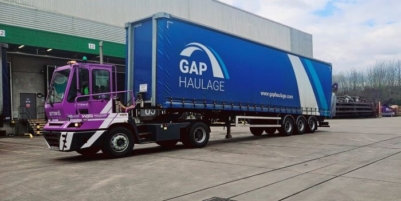-
Nutrivend selects Forterro’s Orderwise to support online expansion and streamline operations - April 11, 2025
-
ARROWXL LAUNCHES AMBITIOUS ZERO WASTE ROADMAP - April 8, 2025
-
THE BCMPA’S NEW CAMPAIGN DRIVES OUTSOURCING SUCCESS IN Q1 - April 7, 2025
-
BLACKOUT TECHNOLOGIES TARGETS TELEMATICS-INTEGRATED MOBILE DEVICE BLOCKING TO COMBAT SMARTPHONE DISTRACTION - April 1, 2025
-
Sparck Technologies awarded Royal designation - March 27, 2025
-
OpenADR Alliance announces first OpenADR 3.0 certified products with EVoke Systems, E.ON Energy and Universal Devices - March 25, 2025
-
Growing fulfilment and contract packer appoints new Managing Director - March 25, 2025
-
When is it time to invest in a WMS? Understanding the key trigger points - March 25, 2025
-
eCapital helps Vantage Recruitment on its journey to financial success - March 24, 2025
-
Hugo Beck Celebrates 70 Years of Packaging Innovation with Open House Events - March 20, 2025
How to measure good compliance vs bad compliance – and why cheaper service providers can damage a shipper’s business.
Too often clients seek to cut corners in the hope of saving money. But the results can be devastating, says Bidvest International Logistics.
Road continues to be the transport mode for the majority of goods in South Africa.
With such vast quantities of freight on the highways, it stands to reason that an exceptional degree of compliance is required to meet both consumer and client demand.
Because the industry faces numerous challenges – which the South Africa Road Freight Transport Market Report 2021 identifies as pressure on consumer spending and transport costs, high input costs, competition from e-commerce platforms, labour demands and border post and port congestion, among others – there is a need to shore up compliance standards to assure clients their goods are in safe hands.
According to Arrive Alive, in South Africa larger fleet sizes are the norm, making the management of those fleets more complex. Often multiple systems/software/Excel spreadsheets are required to keep track of the status of each asset.
It is the responsibility of operators to ensure vehicles are in possession of a Certificate of Fitness, there is no overloading, pre-trip inspections are carried out, drivers hold the required professional drivers permit (PDP) and all drivers undergo regular medical check-ups.
In such a vital sector, there simply is no room to cut corners. The end result for those clients seeking cheaper compliance options might be that unroadworthy freight vehicles crash and even contribute to the country’s already-alarming road death statistics.
From a business perspective, non-compliance can also be devastating, says Bidvest International Logistics (BIL) Roadfreight SHERQ manager, Taryn Wenlock.
Not only can material and financial loss occur, but there can also be an interruption of business if the product being transported is part of the production process, particularly if there is high demand for that product.
“Vehicle compliance is a key factor to ensure that the vehicle is not impounded which would create a delay, Wenlock says.
“There can also be situations where people end up with criminal records or the business might be charged higher insurance premiums. Even worse is if a negative incident is covered in the media, which could force the business to close.”
Wenlock’s responsibility as a SHERQ (Safety, Health, Environment, Risk and Quality) manager is to ensure the relevant training, policies, procedures and risk assessments are in place and that all regulations and legislations are adhered to and updated as and when Acts require this.
She also ensures compliance with regulations and legislations regarding the transportation of hazardous and non-hazardous goods from suppliers to their clients.
To ensure clients are getting quality compliance from their logistics service provider, Wenlock and her team have devised a proven ‘check list’.
“We are effectively managing the risk of potential financial loss arising out of legal penalties and financial forfeiture, or material loss through non-compliance with regulatory requirements, industry standards, or internal policies,” she says.
“This is ensured or obtained by measuring and monitoring the service provider’s performance based on on-time deliveries, incidents and overall performance of the service provider.”
BIL also conducts audits on the service provider every two years, and ensures it is SQAS (Safety & Quality Assessment System) accredited and mirrors BIL’s standard operating procedures. Essentially SQAS evaluates the quality, safety, security and environmental performance of the service provider.
A further point on the check list is to set objectives, targets and goals that are received in a monthly report based on KPIs or KPAs.
“Having a clear, effective compliance programme makes it clear to stakeholders that compliance is a top priority for your company. It shows your commitment to doing business the right way and to the highest ethical standards,” Wenlock says.
It is a sentiment BIL national compliance and risk manager Lawrence Aldworth agrees with wholeheartedly.
“Compliance to all laws and regulations are obviously non-negotiable. However, by focusing on compliance to quality requirements, an organisation will ultimately ensure its ability to consistently meet its client requirements,” he says.
“Given the global environment in which we operate, getting the correct goods to the correct place in the correct condition, and at the correct time, is an ever-increasing priority for the supply chain and consumers alike.”
Aldworth suggests that clients should always be proactive in their approach, and verify “upfront” that the intended service provider has a good track record of quality compliance.
































